
[Hide]
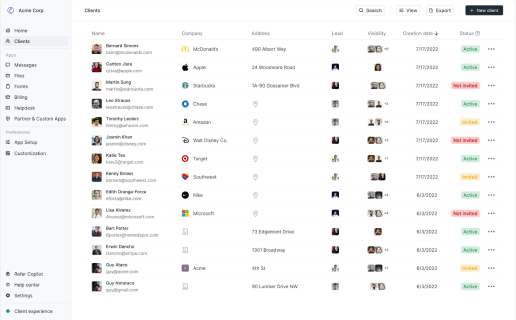
Modern firms use Copilot
Differentiate your service business with white-label portal that gives your clients a one-stop shop to access dashboards, submit tickets, send messages, make payments, and more.
4.9 rating
I have no shame when I say that when I first started my marketing agency, I was not organized at all. Spreadsheets, scattered emails, and endless Slack messages meant I’d forget follow-ups, lose important files, and spend hours searching for client info buried in different tools.
Gmail here, Google Drive there, Airtable sheet there, it was a lot of back and forth. And also really frustrating.
I quickly realized that this “duck taped” system wasn’t sustainable. That’s when I started looking into client database software, and honestly, it was a game-changer. Instead of wasting time hunting for files or trying to remember the last conversation with a client, I had everything in one place — organized, accessible, and automated.
So, I’m here to write this article for the younger version of myself. And hopefully, you’ll walk away with some valuable insights on how to actually feel good while running an agency.
Alright, let’s go over what makes client database software different from a CRM, what you should consider when trying to find a platform that works for you, and go over 10 of my favorite tools you can use right now.
What is client database software?
Client database software helps businesses consolidate scattered client details, project histories, communications, and other critical data into unified customer profiles.
These tools are designed to help you run an agency, a freelance business, or a large service firm. They generally have features like custom intake forms, built-in tools for messaging, file sharing, and more — allowing simple real-time team collaboration. Most of these tools (at least the powerful ones) also integrate with other APIs to bring your entire tech stack together.
But you might be asking, what's the difference between client database software and CRMs? Great question! They sound pretty similar — but there are some key differences. Client database tools organize client information to help businesses deliver on their services. CRMs focus more broadly on managing sales, marketing, and customer service processes.
There can be some overlap in capabilities. But while CRMs take a sales funnel view of customers, client databases zero in on optimizing the delivery of services.
The best systems integrate the two for a comprehensive approach across the client lifecycle.
What should you look for in client database software?
When evaluating client database tools, focus on the features that will maximize value for your business. Here are five key factors to consider:
Price
Client database software ranges from free to hundreds per user/month. Compare plans not just on price but on functionality. Make sure core features align with your needs before paying for unnecessary bells and whistles. Consider scalability, too — how cost-effectively does the platform support growth?
Ease of Integration
The best client database tools don't silo your data. They give you the flexibility to integrate with other platforms across your tech stack. This allows you to centralize information flows that power your service delivery model. Prioritize open API and Zapier integration for connecting the dots across systems.
Ease of use
Cumbersome, complex software won't effectively streamline operations. Clean interfaces encourage team adoption. Make sure core functions like setting up databases, entering records, customizing fields/forms, and running reports are simple and point-and-click. No developer skills are required.
Security
You have a responsibility to protect sensitive client data. Ensure potential platforms offer enterprise-grade security: encryption, access controls, regular audits, backup redundancy, and SOC2 compliance.
Features
Align must-have features to your specialized agency requirements around client management, project collaboration, and service delivery needs. Unique value-driving capabilities might include automation, custom forms, two-way client messaging, file sharing, and more.
Alright, now let’s get into our list of the best client database software and tools.
10 best client database software and tools in 2025
Here are our top picks for the best client database software:
Alright, let’s go over each of these.
1. Copilot

- Best for: Service-based businesses
- Pricing: Starts at $39 per month (billed annually)
Copilot is a no-code platform that lets freelancers, agencies, and startups build custom client portals in minutes.
At its heart, Copilot is about helping service-based businesses improve the client experience by providing seamless, personalized interactions. With a focus on customization, Copilot gives you the tools to customize every part of the client journey.
From branded login pages to dynamic, real-time client dashboards, Copilot lets you build a professional and awesome client portal. Copilot also has an app marketplace so you can integrate your existing tools into a secure environment. Need DocuSign for contracts, Stripe for invoicing and subscriptions, or Look Studio for analytics dashboards? Copilot brings it all together.
Go ahead and play around with the platform yourself:
Copilot notable features
Here are some of Copilot’s popular features:
- No-Code client portal builder: Build and launch a custom client portal in minutes with a drag-and-drop interface — no coding needed. Customize the experience to fit your business.
- Centralized client database: Store all client info, docs, and interactions in one secure spot. Organize client profiles with custom fields, track communication history, and access everything anytime.
- Branded client experience: Look professional with fully customizable branding — white-labeled portals, personalized dashboards, and branded login pages.
- Client dashboards: Give clients an interactive self-serve dashboard to track projects, view invoices, sign docs, and communicate.
- Secure messaging & file sharing: Make communication easy and secure with built-in messaging and file sharing. Keep all conversations and files within the client portal.
- Payment processing: Manage invoices, subscriptions, and payments within the portal with Stripe integration for a seamless and automated billing process.
- Client workflow automation: Automate client onboarding, follow-ups, approvals, and other repetitive tasks to save time and stay consistent with client interactions.
Ratings and reviews
Here’s what customers of Copilot have to say about the platform:
- G2: 4.8 out of 5-star rating (from +208 reviews)
- Capterra: 4.7 out of 5-star rating (from +22 reviews)
2. Keap
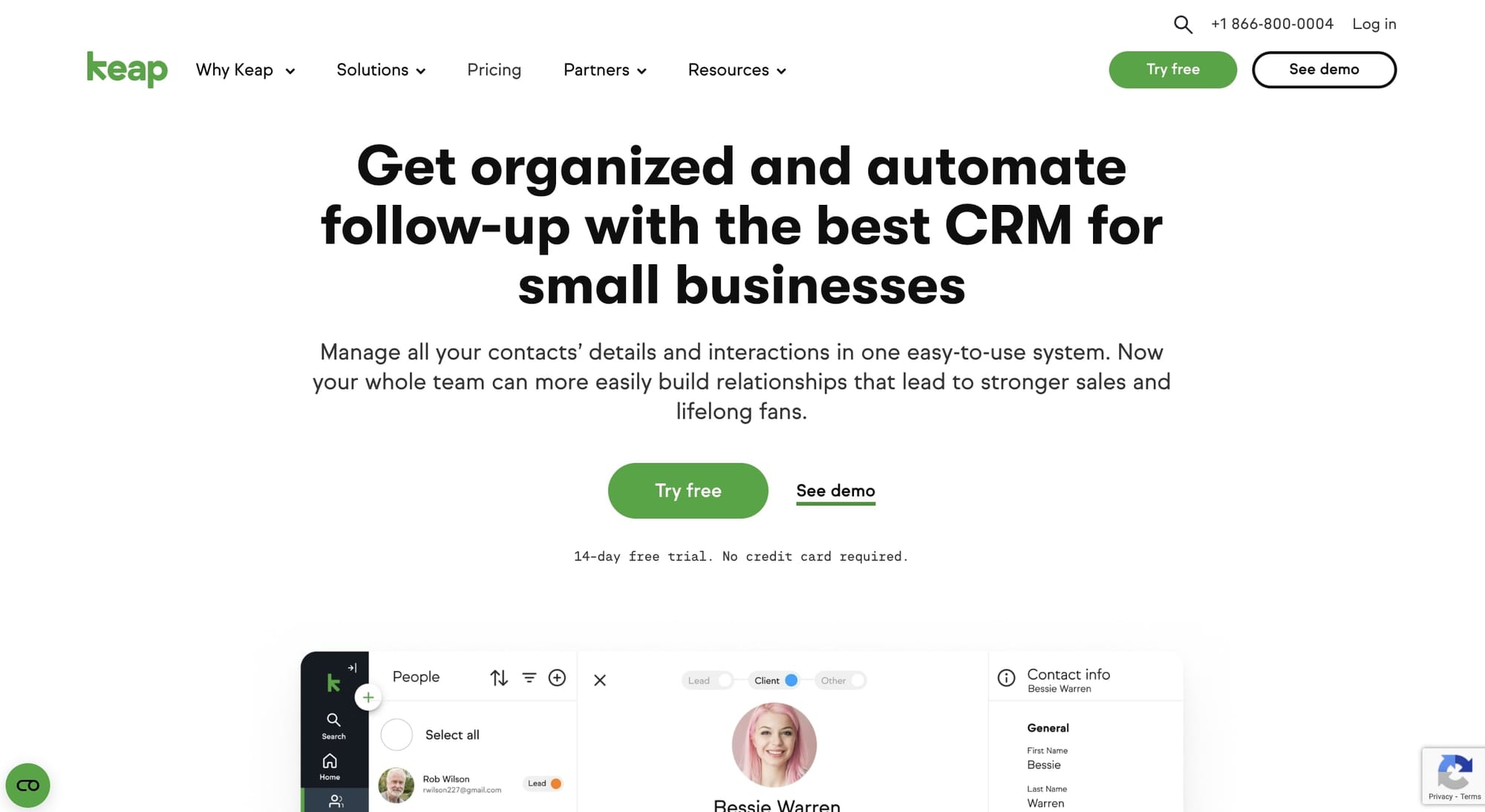
- Best for: Those looking for a HubSpot alternative.
- Pricing: Starts at $299 per month
Keap makes client management feel good by centralizing data flows into one easy-to-use CRM platform. Core features facilitate contact organization and process automation tailored to service agencies.
The system gives your whole team a comprehensive overview of each client for personalized communication that builds loyalty. Quick contact tagging then triggers targeted, automated follow-ups to drive retention.
Keap notable features
Here are some of Keap’s popular features:
- One client database: Store and manage all client interactions in one place, across all your devices.
- Simple contact management: Tag and segment contacts with tags, filters, and custom fields to personalize and streamline.
- Automated follow-ups: Set up email and text follow-ups based on client actions so you don’t have to.
- 5,000+ apps via Zapier: Connect with 5,000+ apps like QuickBooks, Gmail, Calendly, and more to automate and boost productivity.
- Sales & marketing automation: Automate lead capture, email marketing, appointment scheduling, and sales pipelines to save time and convert more.
- Built-in payment processing: Accept payments through invoices, checkout forms, and integrations with Stripe, PayPal, and WePay to reduce friction in the sales process.
- Business phone line (U.S. & Canada): Get a separate business phone number for calling and texting to keep it professional.
- Detailed analytics: See sales performance, marketing results, and client behavior with custom reports and dashboards.
- Lead scoring: Auto-score and prioritize leads based on engagement, purchase history, and more to focus on the best leads.
- Landing page & form: Build and launch landing pages and lead forms without code.
Ratings and reviews
Here’s what customers of Keap have to say about the platform:
- G2: 4.2 out of 5-star rating (from +1,561 reviews)
- Capterra: 4.1 out of 5-star rating (from +1,292 reviews)
3. Zendesk Sell
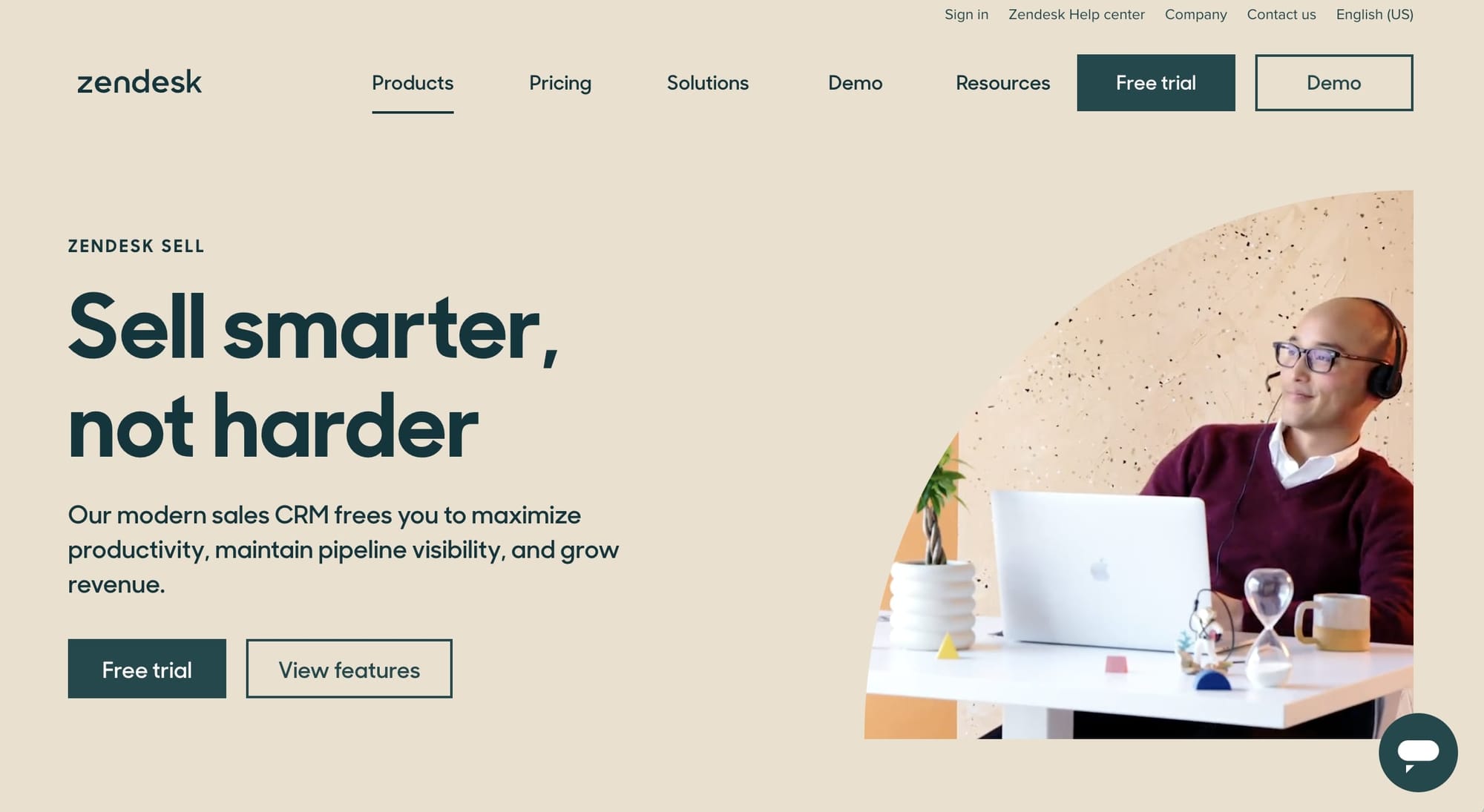
- Best for: Sales teams
- Pricing: Starts at $19 per month
Zendesk is a well-known name in the CRM game. Its "Sell" segment provides a unified customer relationship management platform tailored to drive sales team productivity. It seamlessly captures all prospect and customer interactions in one place to keep deals moving forward.
Robust pipelines facilitate the organization of thousands of leads and deals by stage. Custom views, smart lists, and sales analytics provide visibility to make sure no opportunity falls through the cracks. Workflows automate repetitive administrative tasks so reps can focus on high-value activities like closing deals.
An open API allows extensive integrations to weave Zendesk Sell into your existing technical ecosystem. Quickly connect the dots across platforms like marketing automation, accounting, payments, and more.
Easy customization accommodates your unique sales methodology without involving IT or developers. Set up multiple pipelines to reflect different sales cycles, approval processes, and product lines — whatever makes the most sense for your business. Default templates allow quick implementation, while simple tools maximize flexibility.
Zendesk Sell notable features
Here are some of Zendesk’s popular features:
- Customer profiles: Store all customer data, interactions, and history in one place so sales teams have a 360-degree view of each customer for better relationship building.
- Pipeline management: Track deals at every stage, set reminders, and automate follow-ups to keep the sales process moving and prevent revenue loss.
- Advanced analytics & reporting: Get deep insights into sales performance, pipeline health, and conversion rates with customizable dashboards and real-time reporting.
- Multichannel communication (email, voice, & text): Engage with leads and customers via email, calls, and SMS directly within the platform with automated logging and tracking for easy follow-ups.
- Automated processes: Automate manual tasks with AI, including lead scoring, deal updates, and workflow triggers to boost productivity.
- Mobile CRM app: Access customer data, update deals, and communicate with customers on the go with the full-feature mobile app.
Ratings and reviews
Here’s what customers of Zendesk say about the platform:
- G2: 4.2 out of 5-star rating (from +487 reviews)
- Capterra: 4.3 out of 5-star rating (from +158 reviews)
4. Zoho Creator
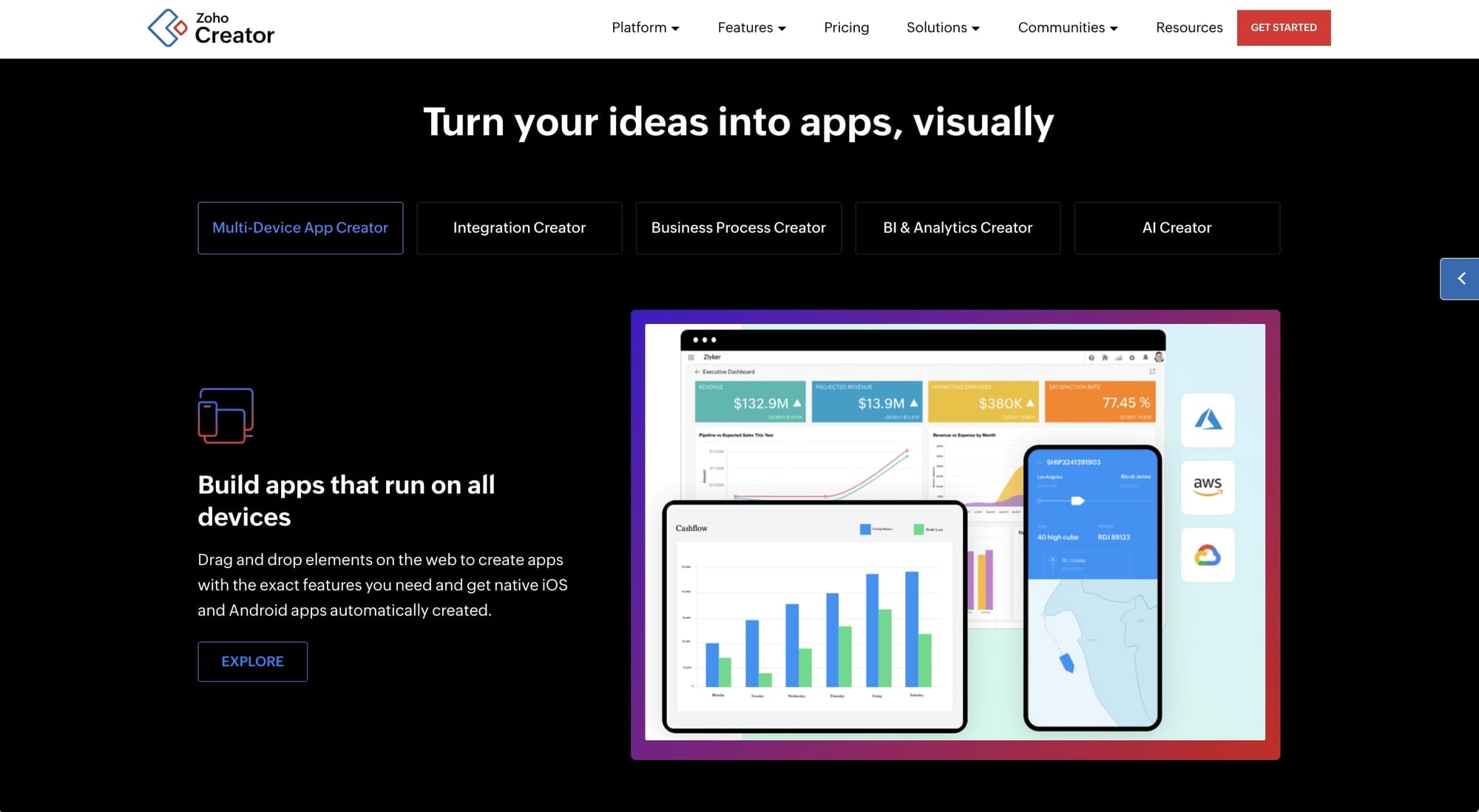
- Best for: Development agencies
- Pricing: Starts at $8 per user/month
Zoho Creator is a low-code application development platform that empowers agencies to create custom client databases easily. Its drag-and-drop builder allows anyone to construct forms for gathering information from clients. Relationships between forms then automatically organize data inputs for unified access across teams.
Whether collecting project requirements, managing processes, tracking issues, or gathering feedback, Zoho Creator helps agencies facilitate the delivery of services. Pre-built templates allow quick customization for common use cases like client onboarding, quality control tracking, recruiting, and more.
Real-time notifications keep team members up-to-date as new client information is entered into the system. Custom rules facilitate process automation for tasks like assignments, approvals, reminders, and alerts based on triggering actions.
Comprehensive reporting and interactive dashboards provide insights to enhance client service based on collected data. Views can be filtered and sorted with simple drag-and-drop gestures — no advanced technical skills are required.
Zoho Creator's notable features
Here are some of Zoho Creator's popular features:
- Cloud hosting: Secure cloud infrastructure that scales with your business for high availability and minimal downtime.
- Auto collect data: Create custom forms with drag-and-drop to collect, validate, and store data, reducing manual entry.
- Import & integrate external data: Import data from spreadsheets, databases, and other third-party apps including Zoho apps and external services like Google Drive, Salesforce, and QuickBooks.
- Mobile: Access, edit, and manage your apps from anywhere with native mobile apps for iOS and Android.
- Access control: Set user permissions to view, edit, and manage data.
- Notifications: Get notified for events, approvals, and data updates via email, push, or in-app messages.
Ratings and reviews
Here’s what customers of Zoho Creator say about the platform:
- G2: 4.3 out of 5-star rating (from +175 reviews)
- Capterra: 4.3 out of 5-star rating (from +160 reviews)
5. HoneyBook
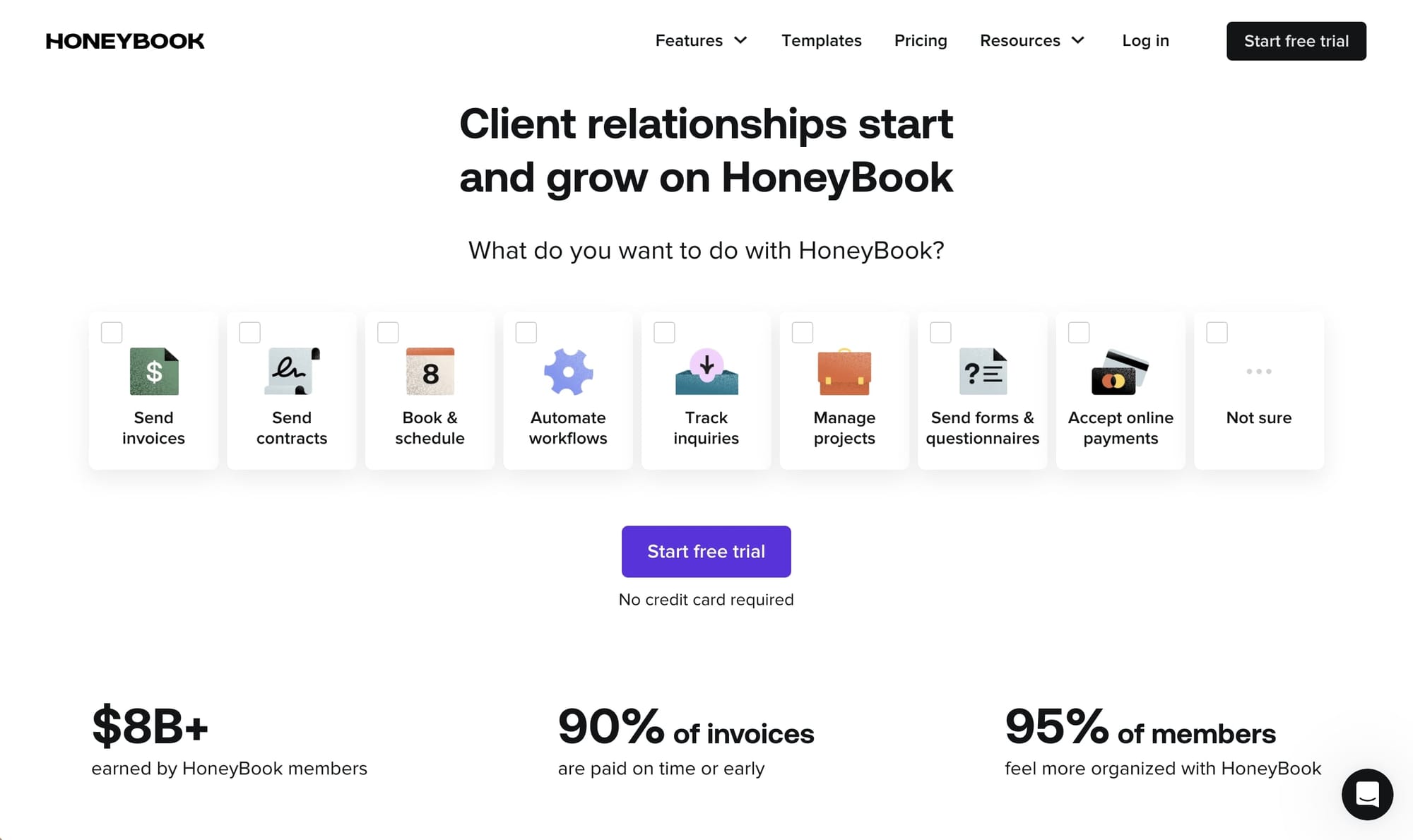
- Best for: Freelancers
- Pricing: Starts at $19 per month
HoneyBook is an up-and-coming platform, flaunting $8B+ earned by its members. It provides an all-in-one client management solution for service professionals. Features like improved communication, invoicing, and intelligent lead prioritization optimize business operations.
A centralized activity log of messages, emails, calls, and comments facilitates seamless collaborations. Custom-branded templates will impress new clients while keeping existing ones up-to-date on projects.
Easy online invoicing and integrated payment processing ensure cash keeps flowing smoothly. Automatic reminders reduce late payments while retention tools build lasting client relationships.
Prioritized lead recommendations powered by the HoneyBook AI help focus energy on qualified prospects most likely to convert to clients. Customizable automation nurtures relationships and provides personalized experiences.
Related Reads: Best HoneyBook alternatives for freelancers and agencies
HoneyBook's notable features
Here are some of HoneyBook's popular features:
- Client hub: All emails, messages, and files in one place, seamless client collaboration and communication.
- Lead scoring: Auto-score and rank leads based on engagement, inquiry details, and custom criteria to focus on the best opportunities.
- Client journey automation: Automate key touchpoints from lead capture to contract signing and payment collection.
- Projects, contracts, tasks: Projects organized with task lists, contract templates, milestones, and deadline tracking.
Ratings and reviews
Here’s what customers of HoneyBook say about the platform:
- G2: 4.5 out of 5-star rating (from +175 reviews)
- Capterra: 4.7 out of 5-star rating (from +646 reviews)
6. Monday.com
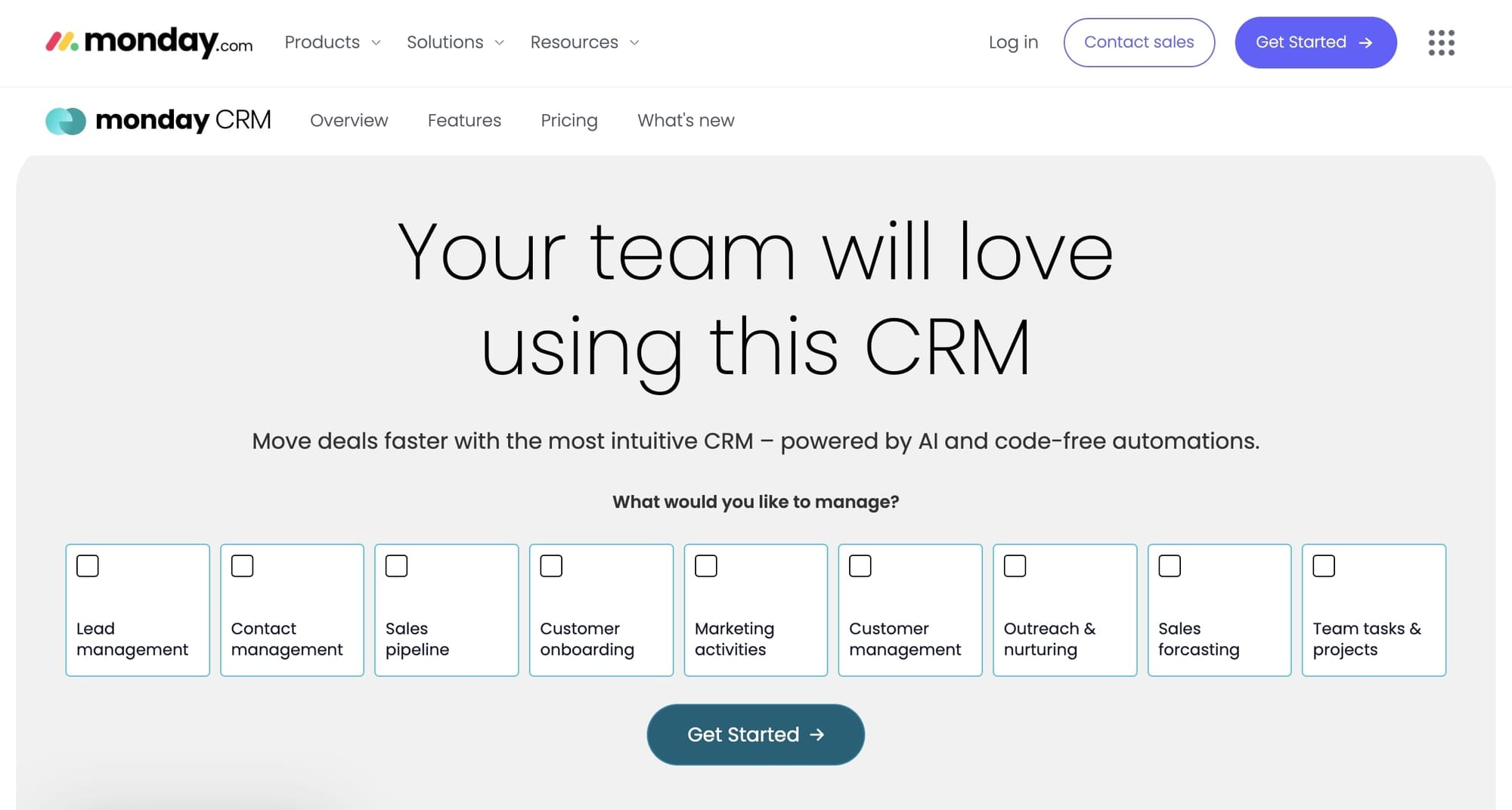
- Best for: Solopreneurs and small businesses
- Pricing: Has a free plan, then starts at $9 per user/month.
With an interface as beautiful as the smart apps we use daily, Monday.com is quickly becoming renowned as an invaluable CRM platform optimized for transparency and seamless collaboration.
Its versatility to adapt to unique agency strategies makes onboarding smooth and painless. Custom layouts mapped to an organization's sales methodology eliminate redundant manual data entry. Automation handles mundane tasks like lead assignments, email triggers, and activity logging so teams can focus on service delivery.
Open API and plenty of integrated apps connect surrounding systems for an omnichannel experience. Real-time dashboard views keep the entire lifecycle visible to prevent details from falling through the cracks across departments.
Features like advanced permissions, grouping, dependency mappings, and change management improve cross-functional alignment — which is essential for agencies with distributed teams and specialists.
Monday’s notable features
Here are some of Monday's popular features:
- Mobile optimization: Access your CRM on the go with a fully responsive mobile app, enabling real-time updates, task management, and communication from anywhere.
- 3rd-party software integration: Seamlessly connect with over 200+ popular business apps, including Slack, Zoom, Salesforce, Mailchimp, and Google Workspace, to unify workflows.
- Activity tracking: Keep a detailed log of all client interactions, including emails, calls, meetings, and notes, ensuring no opportunity slips through the cracks.
- Automated lead scoring: Prioritize high-potential leads using customizable scoring criteria based on engagement, demographics, and sales behavior.
- Deal forecasting: Predict revenue and future sales trends with real-time pipeline analytics and AI-powered forecasting tools for better decision-making.
Ratings and reviews
Here’s what customers of Monday say about the platform:
- G2: 4.7 out of 5-star rating (from +12,858 reviews)
- Capterra: 4.6 out of 5-star rating (from +5,406 reviews)
7. Moxo
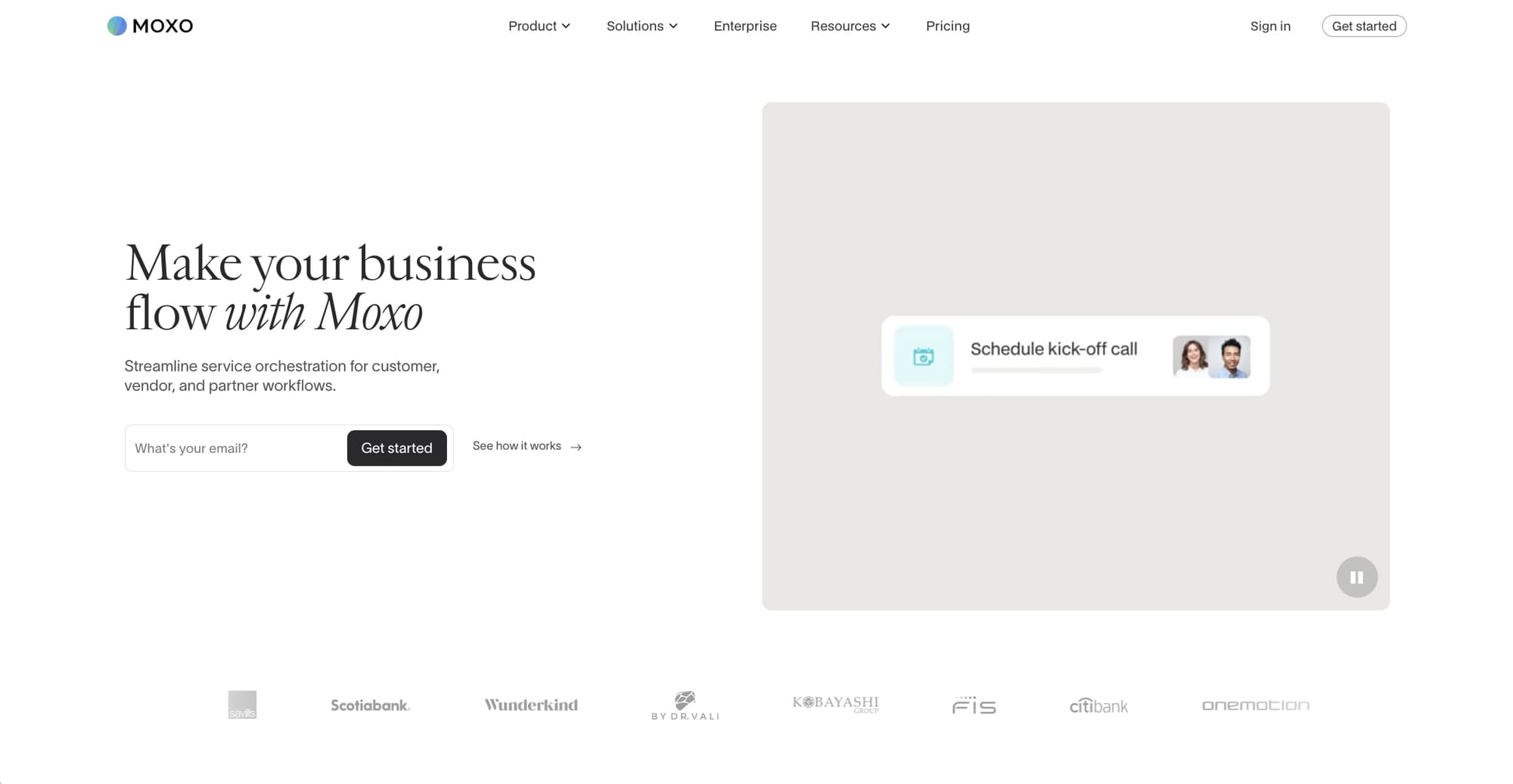
- Best for: Larger firms
- Pricing: Request pricing directly from them.
Moxo is yet another solution to help with client processes and interactions for service teams. Customizable strategies standardize repetitive tasks, while built-in collaboration tools facilitate real-time assistance.
The workflow builder models multi-step processes using easy modular templates. Custom forms, approvals, file requests, and tasks keep work moving efficiently. Integrations support eSignatures, identity verification, and other capabilities.
Omnichannel messaging, file sharing, annotations, and video meetings provide contextual interactivity around processes. Secure portals ensure privacy, while oversight tools give managers real-time status visibility.
For sensitive information, Moxo is trusted by global banks thanks to their stringent GDPR, PSD2, and CSA compliance.
Moxo’s notable features
Here are some of Moxo's popular features:
- Role-based access controls
- Branded client portals
- Industry-leading security
- Process automation
- Customizable forms and templates
- Contextual communication
- Integrated business actions
- Reporting and analytics
Ratings and reviews
Here’s what customers of Moxo say about the platform:
- G2: 4.5 out of 5-star rating (from +164 reviews)
- Capterra: 4.0 out of 5-star rating (from +22 reviews)
8. HubSpot CRM
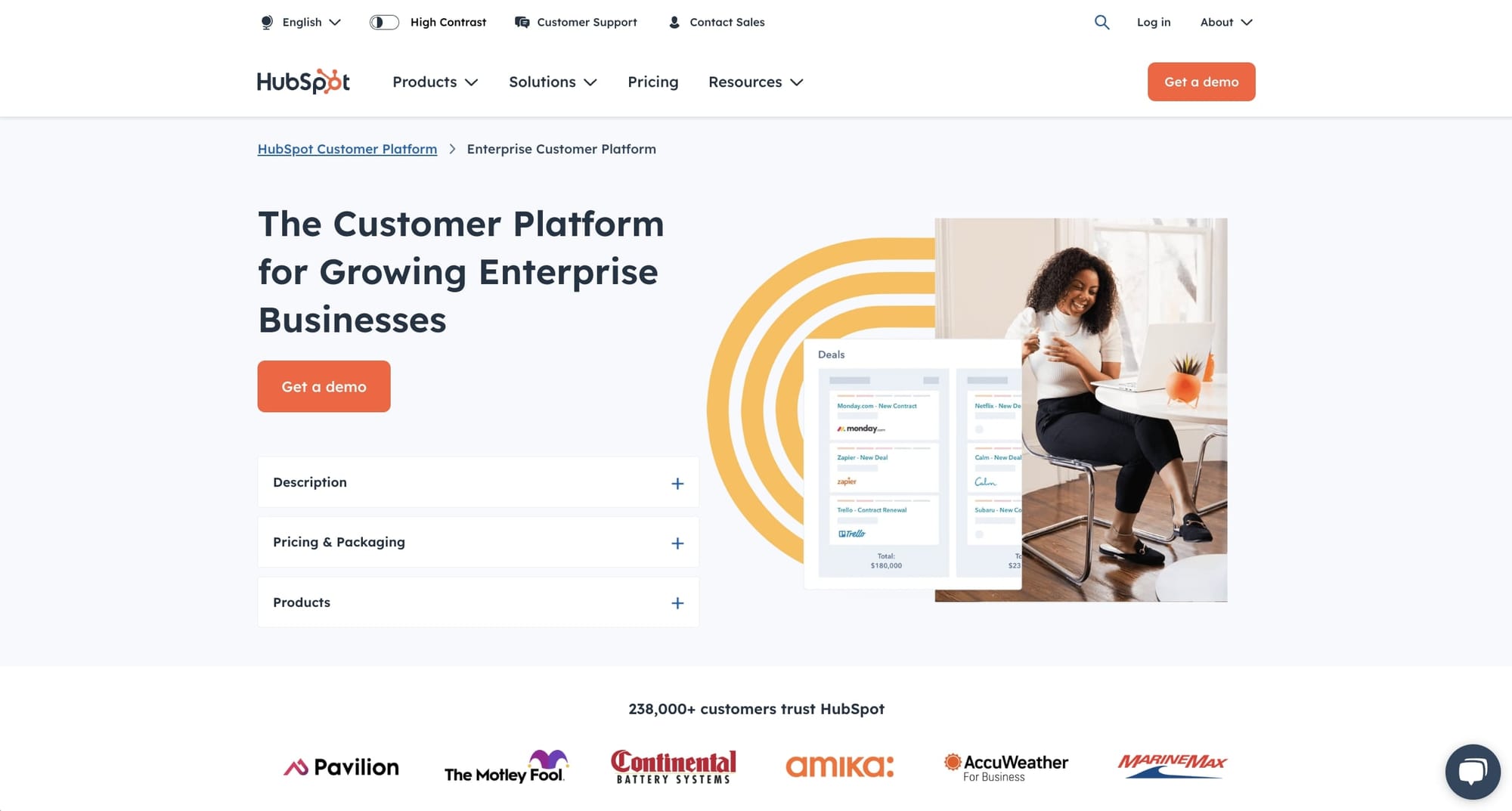
- Best for: Large businesses
- Pricing: Start at $890 per month
Founded in 2004, HubSpot CRM has rapidly become a leader in unifying relationship management across entire client lifecycles. Its mantra of "ease" focuses on mass user adoption, cross-functional alignment, and flexible customization.
Easy-to-use interfaces drive adoption by sales, service, marketing, and admin teams alike. This fuels a common data pool shaping customer experiences. Tight connections also exist between HubSpot's surrounding martech applications for well-rounded support.
Over one thousand integrations weave an open ecosystem, tying platforms together to avoid disruption. For SMBs specifically, HubSpot CRM strikes an optimal balance of essential CRM functionalities like activity logging, pipeline views, sales reporting, email integration, and call analysis without overwhelming complexity.
Its native growth-centric approach also scales comfortably with evolving needs over time — no tedious re-platforming required.
HubSpot CRM's notable features
Here are some of HubSpot's popular features:
- Free starter CSM functionality
- Contact database management
- HubSpot Ecosystem integration
- Sales pipeline views
- 1000+ app integrations
Ratings and reviews
Here’s what customers of HubSpot say about the platform:
- G2: 4.4 out of 5-star rating (from +12,061 reviews)
- Capterra: 4.5 out of 5-star rating (from +4,304 reviews)
9. Pipedrive

- Best for: Enterprise companies
- Pricing: Start at $14 per user/month
Pipedrive has been unique in its focus on streamlining the sales component of client management since 2010. Interfaces tailored to agencies' unique pipelines make onboarding frictionless. Custom fields, granular permissions, advanced filtering, pipeline histories, and parallel deal flows accommodate real-world complexities.
350+ app integrations augment functionality with surrounding systems spanning marketing, accounting, payments, document signing, and more. Native email synchronization maintains context. Custom reporting fosters informed sales strategies based on collected multi-dimensional analytics. Deal forecasting capabilities and sales leaderboards keep individuals focused on key revenue growth drivers. Open APIs allow even deeper customization.
While purposefully more narrow in scope than some CRMs, that singular focus empowers Pipedrive to optimize user experience specifically for sales professionals. Its foundation on enterprise-grade scalability and security means never outgrowing its specialized capabilities agency-wide.
Pipedrive notable features
Here are some of Pipedrive's popular features:
- Deal management
- Product Catalog
- Customizable pipeline
- Email integration
- Sales reporting/analytics
Ratings and reviews
Here’s what customers of Pipedrive say about the platform:
- G2: 4.3 out of 5-star rating (from +2,277 reviews)
- Capterra: 4.5 out of 5-star rating (from +3,034 reviews)
10. Airtable
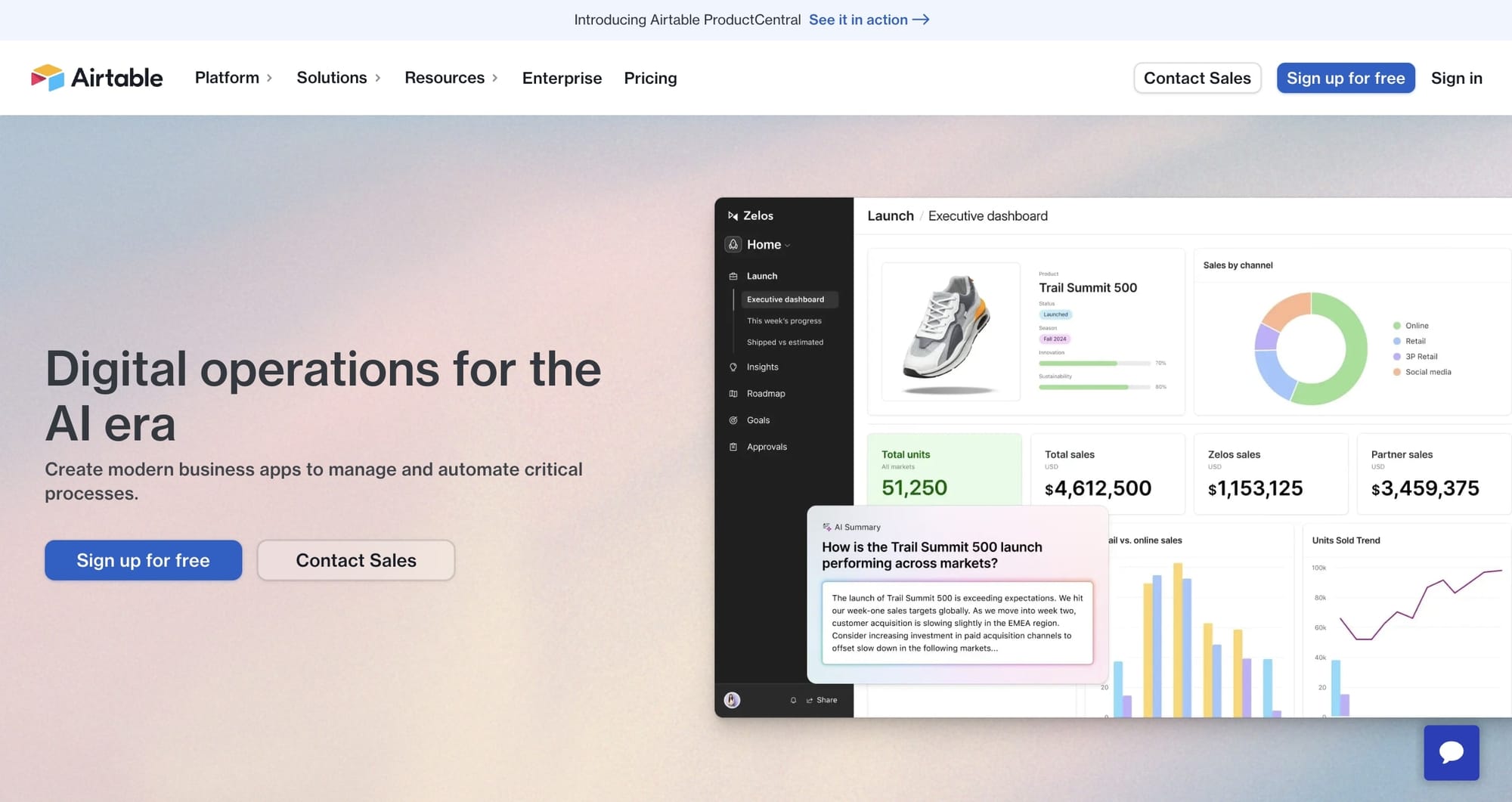
- Best for: Operations teams
- Pricing: Has a free plan, then start at $20 per user/month.
Airtable combines spreadsheets, forms, and project management into a collaborative database for the modern age. Its straightforward interface lets anyone build custom views of business data tailored to agency needs without coding.
Calendar, Kanban, gallery, and Gantt templates facilitate planning around sales pipelines, project tasks, and client onboarding. Automation can be configured to handle repetitive steps as deals progress. API and app integrations then provide further flexibility.
Together, this drives informed collaboration powered by centralized, real-time data visibility across teams — from sales and marketing to service delivery and executive leadership.
Airtable notable features
Here are some of Airtable's popular features:
- Deal management
- Product Catalog
- Customizable pipeline
- Email integration
- Sales reporting/analytics
Ratings and reviews
Here’s what customers of Airtable say about the platform:
- G2: 4.6 out of 5-star rating (from +2,749 reviews)
- Capterra: 4.7 out of 5-star rating (from +2,127 reviews)
Conclusion
Managing clients isn't easy! But the right software helps agencies work smarter, not harder. These 11 platforms centralize contacts, projects, and communication so teams can collaborate easily. Now, you've got an inside look at features, pricing, and real customer reviews.
Evaluate priorities like client portals, custom forms, process automation, etc. Doing so will help narrow options that align with your budget and business goals.
For a cutting-edge solution with branded client environments facilitating real-time collaboration, check out Copilot. Our integrated invoices and two-way messaging optimize communication.
Share this post
Sign up for our newsletter
Subscribe to our newsletter to receive emails about important announcements, product updates, and guides relevant to your industry.
